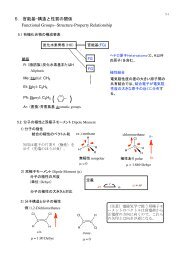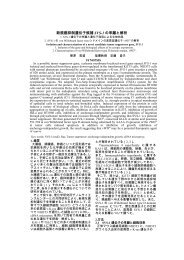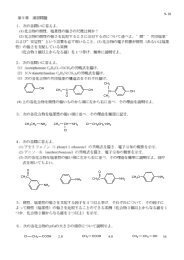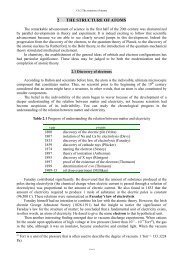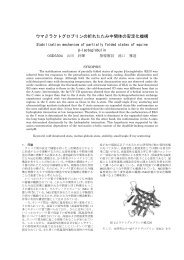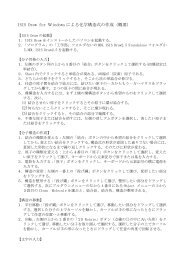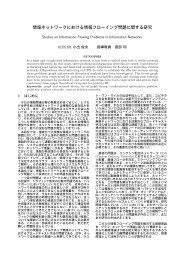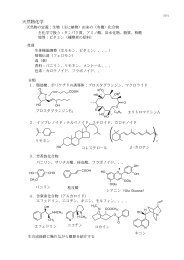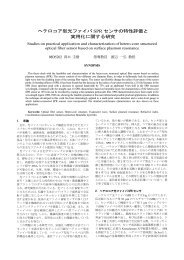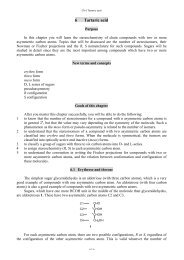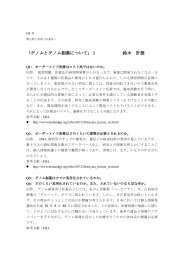Polymer Engineering Education in Pakistan (Asif Qaiser)2r2
Polymer Engineering Education in Pakistan (Asif Qaiser)2r2
Polymer Engineering Education in Pakistan (Asif Qaiser)2r2
You also want an ePaper? Increase the reach of your titles
YUMPU automatically turns print PDFs into web optimized ePapers that Google loves.
Chemical <strong>Education</strong> <strong>in</strong> Asia Pacific, Supplement, 2010, 1, <strong>Pakistan</strong><br />
<strong>Polymer</strong> eng<strong>in</strong>eer<strong>in</strong>g education <strong>in</strong> <strong>Pakistan</strong>:<br />
Curriculum development and prospects<br />
<strong>Asif</strong> Ali <strong>Qaiser</strong><br />
Department of <strong>Polymer</strong> and Process <strong>Eng<strong>in</strong>eer<strong>in</strong>g</strong><br />
University of <strong>Eng<strong>in</strong>eer<strong>in</strong>g</strong> and Technology Lahore, <strong>Pakistan</strong>.<br />
<strong>Asif</strong>aliqaiser@uet.edu.pk<br />
ABSTRACT<br />
<strong>Polymer</strong> process<strong>in</strong>g <strong>in</strong>dustry is among the major contributors to the economy of <strong>Pakistan</strong>.<br />
The <strong>in</strong>dustrial sector comprises ma<strong>in</strong>ly small to medium sized units. To support this large<br />
<strong>in</strong>dustrial sector, there are two departments <strong>in</strong> the country which produce eng<strong>in</strong>eer<strong>in</strong>g<br />
graduates <strong>in</strong> the area of polymer eng<strong>in</strong>eer<strong>in</strong>g and science. The evolution and development of<br />
these degree programs have been discussed. Curriculum design and development of<br />
laboratory facilities of the university degree program have been elaborated <strong>in</strong> detail. The<br />
curriculum was improvised from the exist<strong>in</strong>g chemical eng<strong>in</strong>eer<strong>in</strong>g degree curriculum. The<br />
evolution has been discussed <strong>in</strong> terms of def<strong>in</strong>ed objectives and guidel<strong>in</strong>es, limitations and<br />
available resources. For the future prospects, it has been identified that academia need more<br />
efforts to develop the exist<strong>in</strong>g programs <strong>in</strong> terms of quality and graduate research based<br />
programs are the need of the day.<br />
Keywords:<br />
<strong>Pakistan</strong>, Curriculum development, <strong>Polymer</strong> eng<strong>in</strong>eer<strong>in</strong>g education<br />
1
Chemical <strong>Education</strong> <strong>in</strong> Asia Pacific, Supplement, 2010, 1, <strong>Pakistan</strong><br />
<strong>Polymer</strong> Industry <strong>in</strong> <strong>Pakistan</strong><br />
<strong>Polymer</strong>s related <strong>in</strong>dustries <strong>in</strong> <strong>Pakistan</strong> have more than US$ 1.0 Billion capital<br />
<strong>in</strong>vestment and these have been grow<strong>in</strong>g with a rate of 7.5% (2009). This significant growth<br />
may be attributed to rapidly <strong>in</strong>creas<strong>in</strong>g consumer product demand [1-2]. <strong>Polymer</strong> sector <strong>in</strong><br />
<strong>Pakistan</strong> comprises small to medium scale downstream polymer process<strong>in</strong>g <strong>in</strong>dustries. A<br />
recent break up shows more than 6000 polymer process<strong>in</strong>g units compared to only four res<strong>in</strong><br />
production units <strong>in</strong> the country [3]. The latter produce Polyv<strong>in</strong>yl chloride (PVC),<br />
Polyethylene terepthalate (PET) and High impact polystyrene (HIPS). These res<strong>in</strong> producers<br />
contribute only a fraction to the total raw materials supply <strong>in</strong> the country. It is evident that<br />
development of the plastic <strong>in</strong>dustry has focused more on the process<strong>in</strong>g than on the polymer<br />
res<strong>in</strong> manufactur<strong>in</strong>g <strong>in</strong> the country. The down-stream process<strong>in</strong>g <strong>in</strong>dustry ma<strong>in</strong>ly comprises<br />
<strong>in</strong>jection mould<strong>in</strong>g, packag<strong>in</strong>g, and extrusion units. These units face common key problems<br />
such as raw materials price fluctuation l<strong>in</strong>ked to the global petroleum prices, severe shortage<br />
of skilled and tra<strong>in</strong>ed manpower, product test<strong>in</strong>g and quality certification issues and lack of<br />
research and development. Exports are very limited due to the problems <strong>in</strong> quality<br />
certification, strong dependence of cost of production on energy and raw materials prices and<br />
low competency and poor ‘production economy’. For all these challenges, the <strong>in</strong>dustry seeks<br />
guidance and help from the academia.<br />
History of <strong>Polymer</strong> <strong>Eng<strong>in</strong>eer<strong>in</strong>g</strong> Institutions <strong>in</strong> <strong>Pakistan</strong><br />
Currently, for the population of more than 170 million, there are seventy three public<br />
sector universities and almost sixty privately operated universities <strong>in</strong> <strong>Pakistan</strong> [4]. Among<br />
these, fifty n<strong>in</strong>e universities offer eng<strong>in</strong>eer<strong>in</strong>g programs <strong>in</strong> various fields which have been<br />
recognised by the <strong>Pakistan</strong> <strong>Eng<strong>in</strong>eer<strong>in</strong>g</strong> Council (PEC) [5]. Further, only two <strong>in</strong>stitutions<br />
offer the undergraduate degree programs <strong>in</strong> polymer eng<strong>in</strong>eer<strong>in</strong>g whereas polymer chemistry<br />
2
Chemical <strong>Education</strong> <strong>in</strong> Asia Pacific, Supplement, 2010, 1, <strong>Pakistan</strong><br />
is be<strong>in</strong>g taught either as a course or as the part of organic/physical chemistry courses at<br />
graduate level <strong>in</strong> around thirty public sector universities of the country. This number has<br />
grown (e.g., from seventeen <strong>in</strong> 1995 [6]) over the years with the overwhelm<strong>in</strong>g growth of<br />
number of universities <strong>in</strong> last decade.<br />
In 1988, Plastic Technology Centre (PTC) was set up <strong>in</strong> Karachi with the assistance of<br />
United Nations Industrial Development Organisation (UNIDO). It started with short courses<br />
<strong>in</strong> polymer science and technology and later <strong>in</strong>troduced a one year diploma program <strong>in</strong> plastic<br />
technology <strong>in</strong> affiliation with the University of London. The program was upgraded to a<br />
degree program and first batch of B.E. (Bachelor of <strong>Eng<strong>in</strong>eer<strong>in</strong>g</strong>) <strong>Polymer</strong> <strong>Eng<strong>in</strong>eer<strong>in</strong>g</strong><br />
graduated <strong>in</strong> 2001[3]. Later on (<strong>in</strong> 2002), PTC obta<strong>in</strong>ed a grant of 455 million Pak Rupees<br />
(7.6 M USD) from JICA (JAPAN International Cooperation Agency) which was used for the<br />
development of build<strong>in</strong>g and up-gradation of laboratory resources [3]. At the present, the<br />
centre has good laboratory facilities and human expertise especially <strong>in</strong> the area of polymer<br />
process<strong>in</strong>g and fabrication [7]. Curriculum of the program offered by the centre has been<br />
evolved from the technology oriented diploma courses and it focuses on the technological<br />
aspects of polymer process<strong>in</strong>g and test<strong>in</strong>g technologies [8]. Little has been focused <strong>in</strong> this<br />
curriculum on the areas such as polymeric materials syntheses, polymer blend<strong>in</strong>g and<br />
composites, emerg<strong>in</strong>g polymeric materials etc. Moreover, laboratory courses <strong>in</strong><br />
Thermodynamics, Reaction eng<strong>in</strong>eer<strong>in</strong>g, Transport processes are miss<strong>in</strong>g. Similarly polymer<br />
rheology is less focused as only a four credit hour course on “Flow Behaviour of <strong>Polymer</strong><br />
Melts” has been <strong>in</strong>cluded.<br />
University of <strong>Eng<strong>in</strong>eer<strong>in</strong>g</strong> and Technology Lahore announced a four year degree program<br />
<strong>in</strong> polymer eng<strong>in</strong>eer<strong>in</strong>g <strong>in</strong> 2001 and later on <strong>in</strong> 2006; it was entitled as “B.Sc. <strong>Polymer</strong> and<br />
Process <strong>Eng<strong>in</strong>eer<strong>in</strong>g</strong>”. The program enjoyed an <strong>in</strong>itial grant of 30 million Pak Rupees (0.5<br />
3
Chemical <strong>Education</strong> <strong>in</strong> Asia Pacific, Supplement, 2010, 1, <strong>Pakistan</strong><br />
Million USD) from the Higher <strong>Education</strong> Commission of <strong>Pakistan</strong> (HEC) which was utilized<br />
for the establishment of laboratory facilities <strong>in</strong> the area of polymer eng<strong>in</strong>eer<strong>in</strong>g and science.<br />
Curriculum Development<br />
<strong>Polymer</strong> eng<strong>in</strong>eer<strong>in</strong>g and science is a multidiscipl<strong>in</strong>ary field which encompasses chemistry,<br />
physics (mechanics) and various eng<strong>in</strong>eer<strong>in</strong>g discipl<strong>in</strong>es. At the global level, graduate<br />
programs have been more focused as compared to the undergraduate programs. This trend is<br />
probably due to the fact that the specialization of polymer synthesis and characterization <strong>in</strong><br />
the field of chemistry had been established some half century ago. As far as eng<strong>in</strong>eer<strong>in</strong>g<br />
discipl<strong>in</strong>es are concerned, <strong>in</strong>corporation of polymer chemistry <strong>in</strong>to the curricula of<br />
undergraduate chemical eng<strong>in</strong>eer<strong>in</strong>g program has been a matter of recent discussion [9].<br />
Similarly, polymers are be<strong>in</strong>g taught as a course <strong>in</strong> the curricula of already established<br />
eng<strong>in</strong>eer<strong>in</strong>g discipl<strong>in</strong>es [10]. Be<strong>in</strong>g emerg<strong>in</strong>g discipl<strong>in</strong>e, the degree <strong>in</strong> polymer eng<strong>in</strong>eer<strong>in</strong>g<br />
(and science) has been evolved either from plastic technology program or <strong>in</strong>itiated under the<br />
umbrella of already established discipl<strong>in</strong>es like Materials, Chemical or Mechanical<br />
eng<strong>in</strong>eer<strong>in</strong>g.<br />
At the University of <strong>Eng<strong>in</strong>eer<strong>in</strong>g</strong> and Technology Lahore, the Department of Chemical<br />
<strong>Eng<strong>in</strong>eer<strong>in</strong>g</strong> was mandated to anchor the new program <strong>in</strong> polymer eng<strong>in</strong>eer<strong>in</strong>g, keep<strong>in</strong>g <strong>in</strong><br />
view the follow<strong>in</strong>g factors.<br />
1) <strong>Polymer</strong> eng<strong>in</strong>eer<strong>in</strong>g had been taught as an elective specialization course <strong>in</strong> 4 th year of<br />
B.Sc. Chemical eng<strong>in</strong>eer<strong>in</strong>g s<strong>in</strong>ce long. <strong>Polymer</strong> eng<strong>in</strong>eer<strong>in</strong>g was considered as the<br />
extend<strong>in</strong>g and emerg<strong>in</strong>g discipl<strong>in</strong>e of chemical eng<strong>in</strong>eer<strong>in</strong>g with many common areas.<br />
2) Only chemical eng<strong>in</strong>eer<strong>in</strong>g department had the qualified and experienced faculty <strong>in</strong><br />
polymer eng<strong>in</strong>eer<strong>in</strong>g field, though very few <strong>in</strong> numbers.<br />
4
Chemical <strong>Education</strong> <strong>in</strong> Asia Pacific, Supplement, 2010, 1, <strong>Pakistan</strong><br />
Later on, <strong>in</strong> 2006, a new department of <strong>Polymer</strong> and Process <strong>Eng<strong>in</strong>eer<strong>in</strong>g</strong> was established<br />
with full adm<strong>in</strong>istrative autonomy and control. While develop<strong>in</strong>g the curriculum for this new<br />
degree program, follow<strong>in</strong>g objectives were identified.<br />
- The curriculum would address the polymer design, compound<strong>in</strong>g and process<strong>in</strong>g<br />
operations along with the design, development and operation of a chemical plant<br />
produc<strong>in</strong>g polymer res<strong>in</strong> through polymerization.<br />
- <strong>Polymer</strong> process<strong>in</strong>g operations would be <strong>in</strong>cluded <strong>in</strong> the curriculum with the<br />
background of unit operations <strong>in</strong>volved <strong>in</strong> the process eng<strong>in</strong>eer<strong>in</strong>g.<br />
- Courses for polymer properties modell<strong>in</strong>g and predictions and rheology would be<br />
focused.<br />
To fulfil these objectives, two major guidel<strong>in</strong>es were chalked down for the curriculum<br />
development.<br />
- Unit operations and thermodynamics <strong>in</strong>volved <strong>in</strong> process eng<strong>in</strong>eer<strong>in</strong>g would be<br />
<strong>in</strong>cluded <strong>in</strong> the syllabus.<br />
- Appropriate weightage would be given to mathematics, chemistry and comput<strong>in</strong>g<br />
courses <strong>in</strong> the curriculum.<br />
Based on these objectives and guidel<strong>in</strong>es, the degree was entitled as” <strong>Polymer</strong> and<br />
Process <strong>Eng<strong>in</strong>eer<strong>in</strong>g</strong>”. The courses and their prom<strong>in</strong>ent <strong>in</strong>teraction are shown <strong>in</strong> Figure 1.<br />
First and second years studies build the basis with the courses of <strong>in</strong>troductory nature [11]. In<br />
third and f<strong>in</strong>al years, core level courses <strong>in</strong> polymer eng<strong>in</strong>eer<strong>in</strong>g have been <strong>in</strong>troduced with the<br />
emphasis on viscoelastic behaviour of polymers and polymer rheology. These supplement to<br />
the application oriented courses <strong>in</strong> the area of polymer product and processes design. Process<br />
eng<strong>in</strong>eer<strong>in</strong>g stream stems out from the courses such as <strong>in</strong>dustrial stoichiometry and fluid flow<br />
and progresses by encompass<strong>in</strong>g core unit operations (mass transfer, heat transfer etc.),<br />
aim<strong>in</strong>g at the chemical eng<strong>in</strong>eer<strong>in</strong>g plant design. Courses such as polymer structure and<br />
5
Chemical <strong>Education</strong> <strong>in</strong> Asia Pacific, Supplement, 2010, 1, <strong>Pakistan</strong><br />
synthesis and polymer reaction eng<strong>in</strong>eer<strong>in</strong>g support the plant design to be more oriented<br />
towards polymer res<strong>in</strong> and petrochemical plants design and operation.<br />
<strong>Polymer</strong> and Process <strong>Eng<strong>in</strong>eer<strong>in</strong>g</strong> Degree<br />
Advanced Mach<strong>in</strong>e & Product Design,<br />
<strong>Polymer</strong> Process<strong>in</strong>g and Rheology,<br />
<strong>Polymer</strong> Development &<br />
Characterization, <strong>Polymer</strong> Product<br />
Design and <strong>Eng<strong>in</strong>eer<strong>in</strong>g</strong><br />
Process Plant Design, Instrumentation<br />
and Control, <strong>Eng<strong>in</strong>eer<strong>in</strong>g</strong> Management<br />
and Laws<br />
Fundamentals of <strong>Polymer</strong><br />
<strong>Eng<strong>in</strong>eer<strong>in</strong>g</strong>, <strong>Polymer</strong> Process<br />
Simulation, <strong>Polymer</strong><br />
Thermodynamics<br />
Process Heat Transfer, Process<br />
<strong>Eng<strong>in</strong>eer<strong>in</strong>g</strong> Mathematics, Mass<br />
Transfer, Transport Phenomena<br />
<strong>Polymer</strong> Structures &<br />
Synthesis, Thermodynamics,<br />
<strong>Polymer</strong> Reaction<br />
<strong>Eng<strong>in</strong>eer<strong>in</strong>g</strong><br />
Physical Properties of<br />
<strong>Polymer</strong>s, Mechanical<br />
Properties of <strong>Polymer</strong>s<br />
Industrial Stoichiometry,<br />
Particle Technology, Fluid Flow<br />
<strong>Eng<strong>in</strong>eer<strong>in</strong>g</strong> and <strong>Polymer</strong>ic<br />
Materials, Introduction to<br />
<strong>Polymer</strong> Science and<br />
<strong>Eng<strong>in</strong>eer<strong>in</strong>g</strong><br />
Foundation and advanced courses <strong>in</strong> Chemistry, Mathematics,<br />
Physics/Mechanics, Comput<strong>in</strong>g<br />
Figure 1. Syllabus of <strong>Polymer</strong> and Process <strong>Eng<strong>in</strong>eer<strong>in</strong>g</strong><br />
Laboratory Facilities<br />
Laboratory facilities <strong>in</strong> the field of polymer eng<strong>in</strong>eer<strong>in</strong>g, <strong>in</strong> addition to the conventional<br />
chemistry, comput<strong>in</strong>g and physics laboratories, are divided <strong>in</strong>to two groups as shown <strong>in</strong><br />
6
Chemical <strong>Education</strong> <strong>in</strong> Asia Pacific, Supplement, 2010, 1, <strong>Pakistan</strong><br />
Figures 2 and 3. Process eng<strong>in</strong>eer<strong>in</strong>g laboratories comprise rigs cover<strong>in</strong>g the basic unit<br />
operations such as fluid flow and pump<strong>in</strong>g, heat exchange equipments, distillation, absorption,<br />
dry<strong>in</strong>g etc. <strong>Polymer</strong> eng<strong>in</strong>eer<strong>in</strong>g laboratories are, further, sub-categorized <strong>in</strong>to polymer<br />
process<strong>in</strong>g and polymer test<strong>in</strong>g & characterization laboratories.<br />
Process Heat Transfer lab<br />
• Shell and tube heat exchanger<br />
• Tray drier<br />
• Bol<strong>in</strong>g demonstration unit<br />
• Condensation unit<br />
• Convection and radiation heat<br />
transfer apparatus<br />
Mass Transfer lab<br />
• Batch distillation unit<br />
• Cont<strong>in</strong>uous distillation unit<br />
• Liquid-liquid absorption unit<br />
• Gas-liquid absorption unit<br />
• Diffusion coefficient<br />
measur<strong>in</strong>g set up<br />
• Ion exchange res<strong>in</strong><br />
demonstration unit<br />
Fluid Flow Lab<br />
• Bernoulli’s law demonstration<br />
unit<br />
• Fluid Flow rig<br />
• Pumps demonstration set up<br />
• Hydrocyclone<br />
• Compressible flow set up<br />
• Fans/blowers/compressors<br />
demonstration and control<br />
• Sedimentation set up<br />
Instrumentation & Control Lab<br />
• Temperature control unit<br />
• Pressure control unit<br />
• Flow control unit<br />
• Pressure gauge calibration rig<br />
• Thermocouple calibration set<br />
up<br />
• Control of milk pasteuriz<strong>in</strong>g<br />
set up<br />
Figure 2. Process eng<strong>in</strong>eer<strong>in</strong>g laboratories<br />
The former category comprises pilot-plant scale units <strong>in</strong> polymer process<strong>in</strong>g such as pipe<br />
extruder, wire coat<strong>in</strong>g set up, sheet extruder, <strong>in</strong>jection mould<strong>in</strong>g mach<strong>in</strong>e, blown film<br />
extrusion set up etc. <strong>Polymer</strong> test<strong>in</strong>g & characterization laboratories <strong>in</strong>clude modern<br />
<strong>in</strong>struments such as gel permeation chromatograph (GPC), Brabender ®<br />
measur<strong>in</strong>g mixer,<br />
differential scann<strong>in</strong>g calorimeter (DSC), <strong>in</strong>fra-red spectrometer (FTIR), universal test<strong>in</strong>g<br />
mach<strong>in</strong>e (UTM) and various rheometers along with many s<strong>in</strong>gle po<strong>in</strong>t test<strong>in</strong>g <strong>in</strong>struments<br />
[12].<br />
7
Chemical <strong>Education</strong> <strong>in</strong> Asia Pacific, Supplement, 2010, 1, <strong>Pakistan</strong><br />
<strong>Polymer</strong> Characterization Lab<br />
• Gel-permeation chromatograph<br />
(GPC)<br />
• Differential scann<strong>in</strong>g calorimeter<br />
(DSC)<br />
• Fourier-transform IR spectrometer<br />
(FT-IR)<br />
• Brookfield ® rheometer<br />
• Elemental analyzer<br />
• Universal test<strong>in</strong>g mach<strong>in</strong>e<br />
• Brabender ® measur<strong>in</strong>g mixer<br />
<strong>Polymer</strong> Process<strong>in</strong>g and Application<br />
Lab<br />
• Recycl<strong>in</strong>g extruder with<br />
palletize<br />
• 150 t <strong>in</strong>jection mould<strong>in</strong>g<br />
mach<strong>in</strong>e<br />
• Blown film extrusion set up<br />
• Pipe extrusion set up<br />
• Wire coat<strong>in</strong>g extruder<br />
• Blow mould<strong>in</strong>g extrusion set<br />
up<br />
• Hydraulic press for elastomers,<br />
composites and thermosets<br />
<strong>Polymer</strong> Test<strong>in</strong>g Lab<br />
• MFI tester<br />
• Electrical conductivity meter<br />
• Moisture tester<br />
• Shore A & D hardness testers<br />
• Dart impact tester<br />
<strong>Polymer</strong> Synthesis Lab<br />
• High shear glass reactors<br />
• 5 L SS high shear batch reactor<br />
• Glassware and reagents<br />
Figure 3. <strong>Polymer</strong> eng<strong>in</strong>eer<strong>in</strong>g and science laboratories<br />
Current Limitations and Future Prospects<br />
Recently, the department has obta<strong>in</strong>ed 30 million Pak Rupees for the establishment of<br />
laboratories <strong>in</strong> process eng<strong>in</strong>eer<strong>in</strong>g, composite fabrication, reaction eng<strong>in</strong>eer<strong>in</strong>g and also for<br />
the strengthen<strong>in</strong>g of polymer test<strong>in</strong>g and characterization facilities. However, the lack of<br />
qualified faculty is the major challenge faced by the department. So far the department has<br />
relied on the faculty experienced from polymer research and development sector for its<br />
establishment and development. Recently, the University has awarded the overseas<br />
scholarship for higher studies to almost all of the faculty members of the department. Earlier,<br />
some of the faculty members have won the nation wide HEC overseas scholarships. It is<br />
expected that after four to six years, the department will have strong faculty resources<br />
qualified <strong>in</strong> polymer eng<strong>in</strong>eer<strong>in</strong>g and science from some of the best universities of the world.<br />
8
Chemical <strong>Education</strong> <strong>in</strong> Asia Pacific, Supplement, 2010, 1, <strong>Pakistan</strong><br />
The department needs to establish its postgraduate program and strong liaison with local<br />
<strong>in</strong>dustry. It needs to lay down a post graduation base but tra<strong>in</strong>ed and qualified faculty is the<br />
limitation. In the present scenario, best strategy could be the <strong>in</strong>ception of one year post<br />
graduate diploma (PGD) <strong>in</strong> polymer eng<strong>in</strong>eer<strong>in</strong>g and science with best utilization of the<br />
available resources. The department has recently announced MSc eng<strong>in</strong>eer<strong>in</strong>g program which<br />
is a blend of advanced courses <strong>in</strong> Process and <strong>Polymer</strong> eng<strong>in</strong>eer<strong>in</strong>g [13].<br />
References:<br />
1. Industry Overview:<br />
http://www.plastipacpakistan.com/PLASTIC_PRINTING_PACKAGING_EXHIBITION_INDUSTRY_OVERVIEW.htm<br />
2. An Overview of <strong>Pakistan</strong>'s Plastics Industry: http://www.plastemart.com/literature.asp<br />
3. Evolution of <strong>Pakistan</strong>'s Plastics Industry: http://www.plastemart.com/literature.asp<br />
4. http://hec.gov.pk/OurInstitutes/Pages/Default.aspx<br />
5. List of <strong>Eng<strong>in</strong>eer<strong>in</strong>g</strong> Universities: http://www.pec.org.pk/univ.aspx<br />
6. Chemical <strong>Education</strong> <strong>in</strong> <strong>Pakistan</strong>. http://www.t.soka.ac.jp/chem/CEAP/<strong>Pakistan</strong>.html.<br />
7. Plastic Technology Centre, <strong>Pakistan</strong>-Facilities: http://www.ptc.org.pk/facilities.asp<br />
8. Plastic Technology Centre, <strong>Pakistan</strong>- Syllabus: http://www.ptc.org.pk/syllabus.asp<br />
9. Mart<strong>in</strong>a, H. and Christopher, B., "<strong>Polymer</strong> Science <strong>in</strong> Undergraduate Chemical<br />
<strong>Eng<strong>in</strong>eer<strong>in</strong>g</strong> and Industrial Chemistry Curricula: A Modular Approach", J. Chem.<br />
Educ., 83 (10), 1521-1530 (2006).<br />
10. Alan, J. and David, N., "Teach<strong>in</strong>g <strong>Polymer</strong> Science to Third-Year Undergraduate<br />
Chemistry Students", J. Chem. Educ., 76 (2), 232-235 (1999).<br />
11. <strong>Polymer</strong> and Process <strong>Eng<strong>in</strong>eer<strong>in</strong>g</strong> –Undergraduate program:<br />
http://www.uet.edu.pk/faculties/faculties<strong>in</strong>fo/polymer_process/<strong>in</strong>dex.html?RID=undergraduate_program<br />
12. <strong>Polymer</strong> and Process <strong>Eng<strong>in</strong>eer<strong>in</strong>g</strong>-Departmental Labs:<br />
http://www.uet.edu.pk/faculties/faculties<strong>in</strong>fo/polymer_process/<strong>in</strong>dex.html?RID=lab_facilities<br />
9
Chemical <strong>Education</strong> <strong>in</strong> Asia Pacific, Supplement, 2010, 1, <strong>Pakistan</strong><br />
<strong>Polymer</strong> and Process <strong>Eng<strong>in</strong>eer<strong>in</strong>g</strong>-Graduate program:<br />
http://www.uet.edu.pk/faculties/faculties<strong>in</strong>fo/polymer_process/<strong>in</strong>dex.html?RID=graduate_program<br />
(Web sites visited on March 3, 2010)<br />
10



